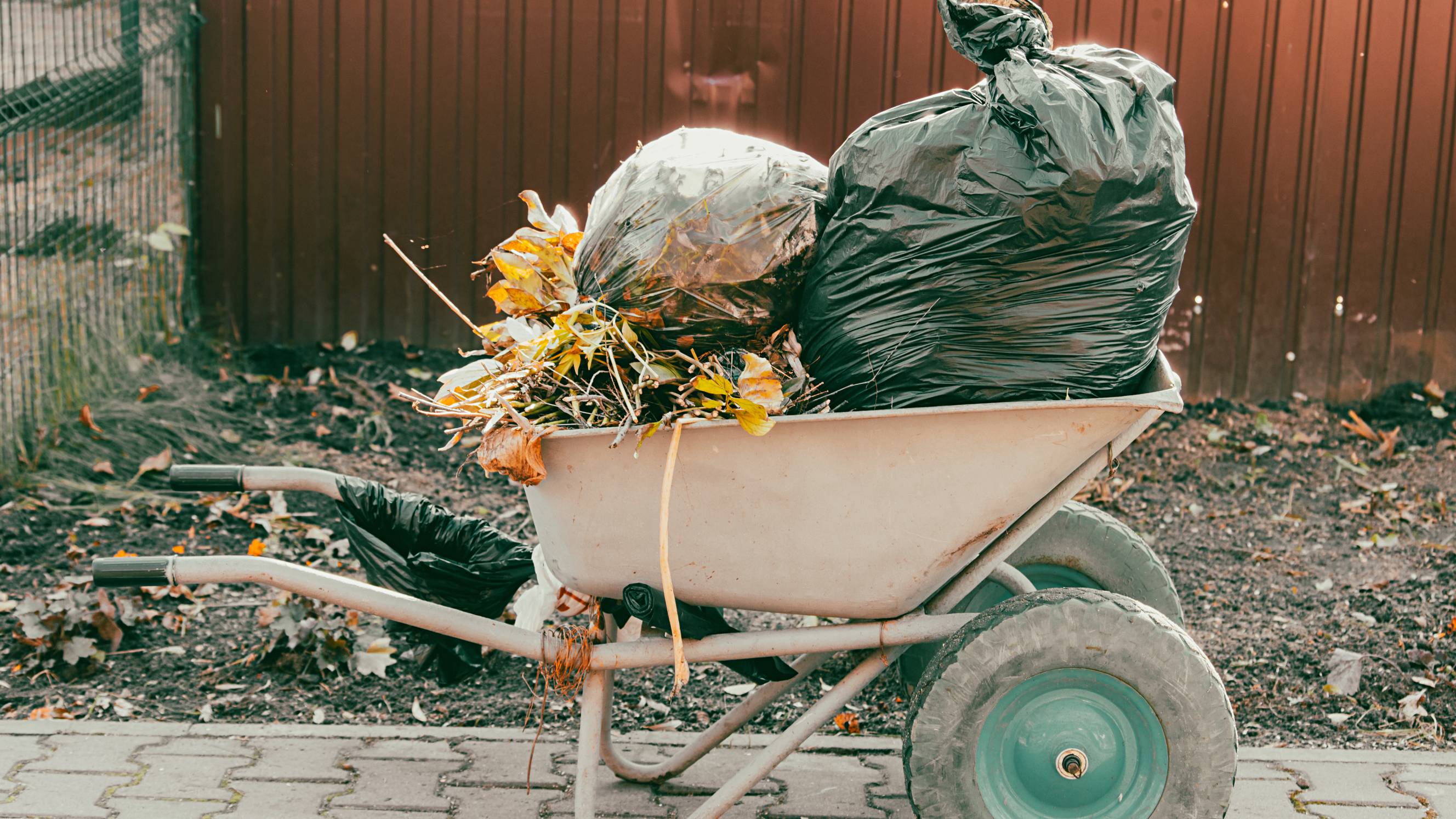
- Home/
- Guides/
- Garden Waste Collection/
- How to Dispose of Garden Waste
Beyond the bin: How to wisely dispose of British garden waste
Sustainable methods for getting rid of garden rubbish
Published on
Key Facts
- Garden waste typically consists of organic matter, including grass clippings, leaves, hedge trimmings, and branches. Inorganic materials, like pesticides or weed killers, can also be considered green waste if used for garden maintenance.
- You can dispose of garden waste sustainably by composting or mulching at home, supporting your local council’s recycling efforts, or hiring a licensed skip.
Did you know that over 11,600 Brits have lodged complaints about unruly gardens in the past year alone? Overgrown gardens, hedges, and overhanging trees were the main culprits for such disputes. While the key to keeping the peace might seem simple enough, at the end of it lies another concern: how to dispose of garden waste you’ve generated in the process.
In this article, learn sustainable methods for removing or reusing green waste to help keep your garden and community healthy.
What are some common types of garden waste?
Gardens can contain different types of organic waste, and understanding each is essential for proper disposal and potential reuse.
Grass clippings and leaves
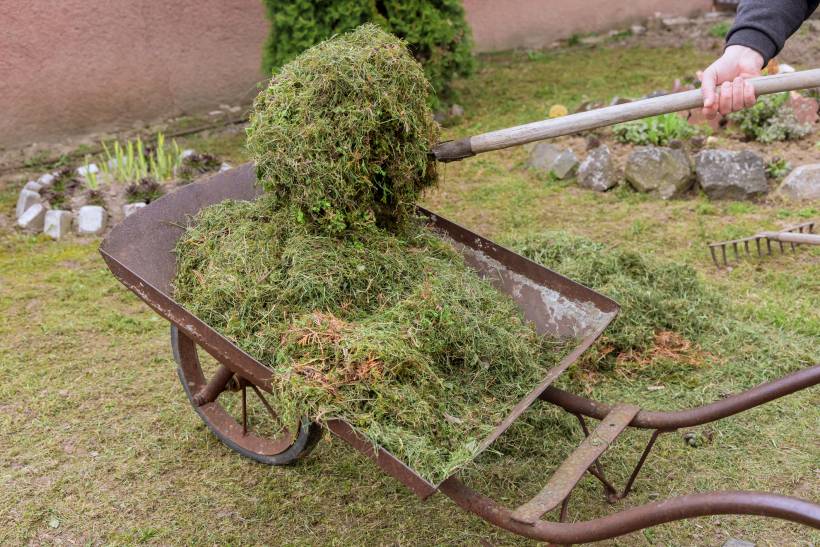 Grass clippings resulting from lawn mowing (Source: iStock)
Grass clippings resulting from lawn mowing (Source: iStock)
Grass, shrubs, and trees are focal elements in any garden, and tidying them up through pruning, trimming, or mowing typically results in a common type of garden rubbish. Thankfully, this green waste is easy to manage and can even benefit your garden.
Bark, twigs, and branches
After pruning your shrubs or trees, you may be left with twigs, bark, and small branches. These can be tossed into your compost pile. However, if the branches you’ve accumulated are too large or have sharp ends due to bad weather, it’s wise to remove them immediately, as they pose a hazard.
Garden tools
Old or damaged garden tools need proper disposal. Items like spades, rakes, shears, and lawnmower blades can wear out over time. Metal tools tend to rust, and plastic handles may break or deteriorate due to age.
Tools with broken parts that can no longer be salvaged should also be removed to give you space for new equipment.
Extra soil
Excess soil, a byproduct of many gardening endeavours, often finds a new home within the garden itself. Whether it’s filling in low spots, amending heavy clay soil, or creating raised beds, this extra soil can be a valuable resource.
However, caution must be exercised, as soil can sometimes harbour pollutants. If there’s any suspicion of contamination, such as the use of chemical pesticides or fertilisers, dispose of the excess soil properly to prevent environmental harm.
Hazardous green waste
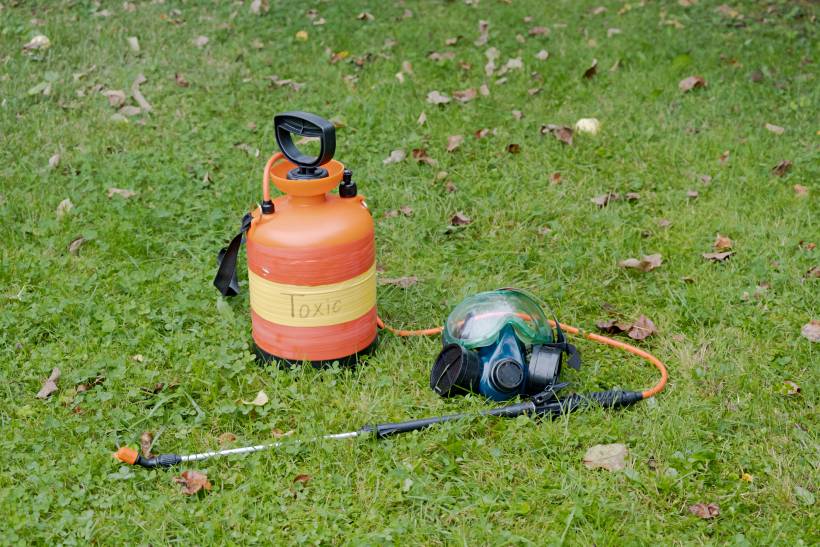 An empty tank of pesticide beside a gas mask (Source: iStock)
An empty tank of pesticide beside a gas mask (Source: iStock)
Some households maintain their yards or gardens using products that may be considered hazardous, such as pesticides, chemical fertilisers, or weed killers. Since these contain toxic chemicals, disposing of them requires careful handling.
Why should you consider sustainable garden waste management?
When it comes to removing garden waste, the easiest solution is rarely the best one. Burning garden waste releases carbon dioxide and toxic chemicals, and dumping rubbish in landfills can be just as dangerous.
Instead of immediately tossing your garden waste in bins, why not adopt sustainable disposal practices? Doing so reduces the need to spend on collectors, plastic bags for garden waste, and even transportation.
At its core, managing garden waste sustainably contributes to cleaner spaces, improved air and water quality, and healthier communities.
How can you properly remove garden waste yourself?
Here are several ways to dispose of garden waste without harming the planet:
Composting
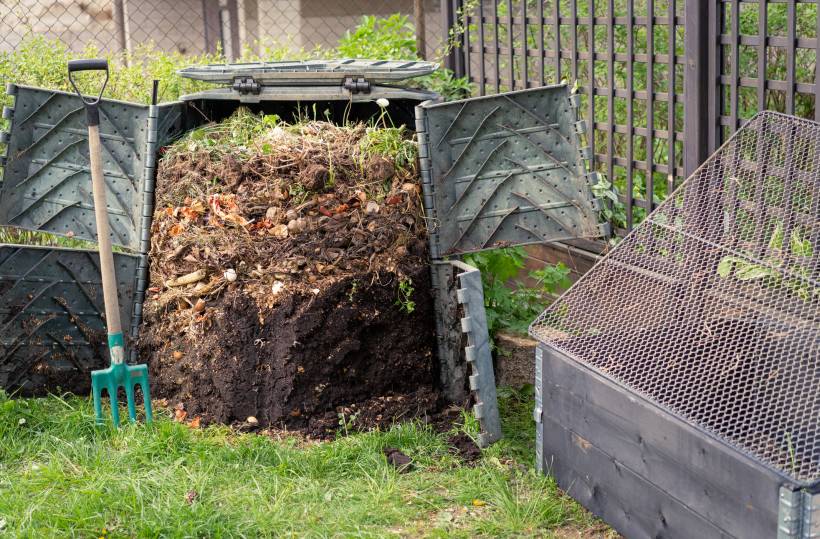 A mound of fresh compost in a bin (Source: iStock)
A mound of fresh compost in a bin (Source: iStock)
Composting enables you to take a small but active part in reducing greenhouse gas emissions, as this practice brings valuable nutrients back into the soil.
The benefits go beyond helping the environment! Composting notably improves soil health and reduces reliance on chemical fertilisers, making it one of the best ways to dispose of garden waste effectively.
To start, choose a sunny spot in your garden for a compost bin or pile. Then, alternate layers of ‘greens’ (such as fresh grass and kitchen scraps) with ‘browns’ (such as dry leaves and small branches). Experts discourage letting materials dominate the pile, especially grass clippings, to avoid a slimy mix.
Remember to turn the pile regularly to aerate it and keep moisture levels up for quicker decomposition. Before you know it, you’ll have a stash of nutrient-packed compost ready for your garden beds!
Mulching
Similar to composting, making mulch is an excellent way to reuse garden waste. A key difference is that mulch is used on the surface only and is not mixed in with the soil. By using mulch, you can moderate soil temperature and conserve water.
To make mulch at home, gather wood chips, grass clippings, and leaves and lay them on your plant bed. Interestingly, mulch can also comprise inorganic waste like stones, gravel, or fabric, so you will never run out of items.
Green waste recycling
Another effective method for disposing of garden waste is to surrender them to your local authorities for recycling. The type of green rubbish you can give depends on the guidelines of your respective council.
For example, the Ealing Council in Greater London only accepts grass cuttings, houseplants, twigs, weeds, flowers, and leaves for its recycling initiatives. Plastic pots, branches, soil, tree trunks, and other garden waste are typically refused.
Does the UK government help with green waste disposal?
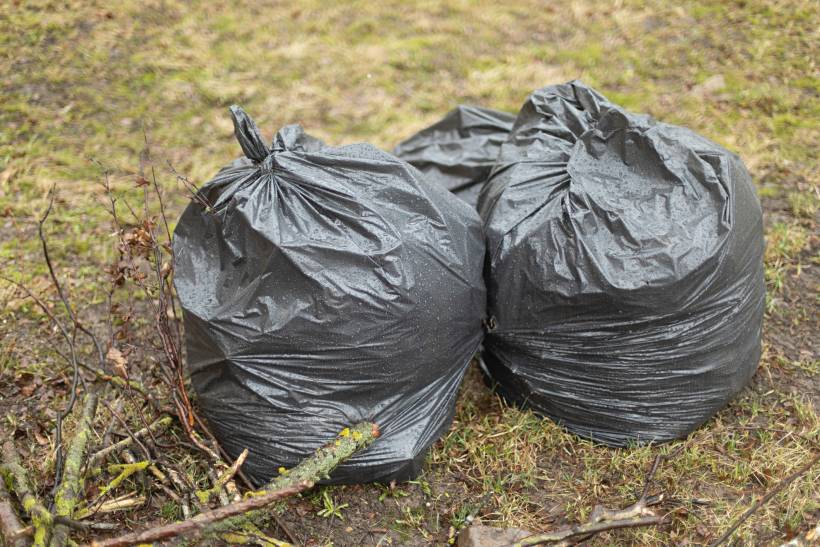 Two black bags full of garden waste (Source: iStock)
Two black bags full of garden waste (Source: iStock)
In the UK, designated waste collection authorities are responsible for collecting household waste, following the Environmental Protection Act 1990. This includes a requirement to separately collect recyclable materials, such as plastic, paper and cardboard, glass, metal, food waste, and garden waste.
Garden waste is typically collected once every two weeks. It may be collected on a different day from your general waste and recycling, depending on your area’s regulations. To learn about your designated garden waste collection dates, reach out to the local authorities directly.
Many councils offer home collection service subscriptions for a small fee. They also have specific guidelines on what can be disposed of through their services. For instance, some areas require bundling or bagging branches or leaves separately.
Generally, collecting garden waste is a low priority for local authorities, so they sometimes stop collection services to prioritise food waste collections.
Can you hire a skip for garden waste removal instead?
If your local authorities pause garden waste collections for a month or if your garden project is too large to undertake yourself, a private skip is a good alternative. Skips come in various sizes, making them suitable for small cleanups or major landscaping efforts.
Practise responsible garden waste disposal with Airtasker
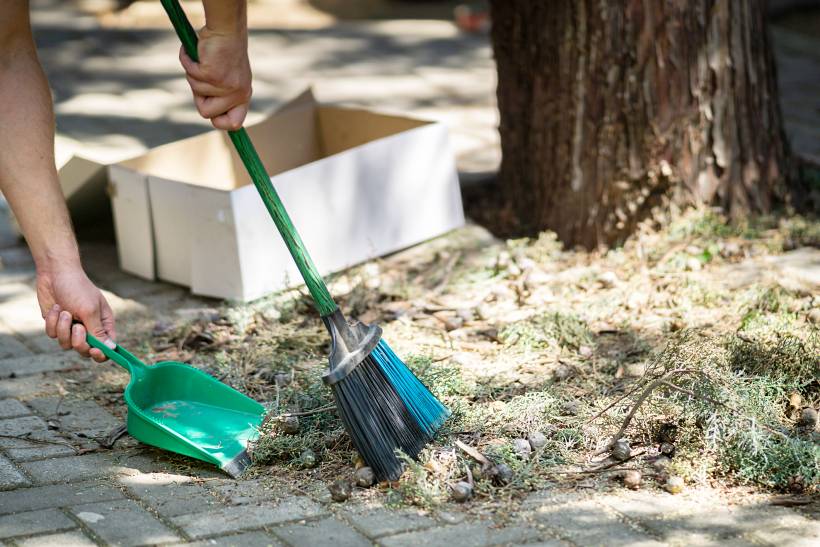 A worker cleaning up fallen pine needles in a yard (Source: iStock)
A worker cleaning up fallen pine needles in a yard (Source: iStock)
If managing garden waste ever feels overwhelming, you’re in the right place. With Airtasker, you can simplify the disposal of hedge trimmings, loose branches, and other organic debris in a way that nourishes both your yard and the environment.
Posting a task conveniently connects you with trusted specialists in your area. Book a garden waste removal service today and enjoy a hassle-free solution to your garden gripes!
FAQs on garden waste disposal
Local authorities typically deliver the garden waste they collect to nearby composting or recycling centres, depending on the type and current state of that particular waste.
Under the EPA 1990, getting rid of waste through means that cause pollution or harm human health is an offence. This is why burning garden waste is highly discouraged when exploring other disposal options.
If multiple neighbours complain about your burning of garden waste, the act will be treated as a public nuisance, which can result in an abatement notice. Refusing to comply may get you fined up to £5,000.
Composting and mulching at home are the cheapest ways to dispose of garden waste. You can cut down on the extra costs of hiring skips while enjoying the long-term benefits they bring to your garden, which include less dependence on synthetic fertilisers.
Find garden waste collectors, fast
Find a garden waste collector